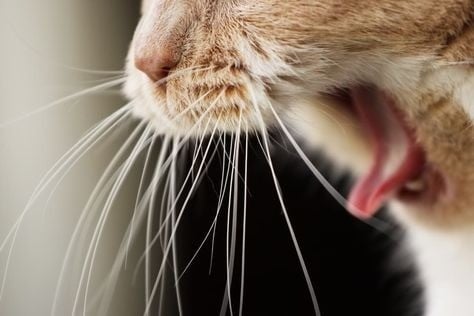
Cat vomiting causes and treatment?
Cats sometimes vomit, which is normal and can happen because of eating something that upsets their stomach or because of an allergy in the digestive system. However, the condition can become more severe when vomiting is so frequent that nothing remains in the cat's stomach but bile. Vomiting may be an acute condition that occurs suddenly, or it may be chronic and occur repeatedly.
Although vomiting in cats may be due to minor causes, it may indicate a larger health problem. Determining the correct cause of vomiting is important and can be complex. Some signs that may precede vomiting include drooling, lip licking, excessive swallowing, and screaming.
Vomiting is characterized by strong abdominal contractions and head movement. What is being vomited, the amount of vomiting, the frequency with which it occurs, and whether it is related to eating or drinking should be monitored, especially the first few times a cat vomits.
Urgent care for vomiting in cats
Cat Vomiting Vomiting is usually a single, benign episode, and as long as no foreign matter or blood is seen, there is no danger. If your cat vomits several times during the day (acute vomiting), you must know and apply the following steps as a guide:
- Check your cat for pale or cold gums, lethargy, diarrhea, fever, or other unusual symptoms.
- If possible, try to locate the food or item that caused the vomiting.
- Keep her food away for about 12 hours, but continue to provide water.
- If your cat stops vomiting, try offering him a teaspoon of his usual food.
- If this persists, continue offering small amounts of food every few hours for the next 24 hours, then return to usual if all other symptoms disappear.
If for some reason your cat cannot keep down water, won't stop vomiting, has blood or unusual substances in the vomit, or if you see her eating something dangerous, call your vet or emergency hospital immediately.
But if your cat vomits frequently — once a day to once a month (chronic vomiting) — there is an underlying problem that should be diagnosed by your vet. You can help by noticing other symptoms such as diarrhea, increased thirst or urination, appetite change, etc. . If vomiting can be associated with any particular food or activity, changing that food or activity may eliminate the vomiting.
A cat may vomit bile (bile) when it has eaten nothing for a long time and has an empty stomach. Bile is a yellow substance produced by a cat's liver that helps digest fats in food. There are several possible reasons why your cat may be vomiting bile, ranging from hormonal problems or liver disease, for example, to simple things like a hairball or an upset stomach. However, if this happens frequently, it is best to contact your vet.
When is cat vomiting considered abnormal?
If your cat is vomiting frequently, twice a month or more, this may be a sign of a more serious problem, such as an infection, inflammation, or ulcer. However, cats can vomit for several reasons. When she vomits, your cat may expel partially digested food or bile fluid, often long after eating.
How can I prevent my cat from vomiting?
Feed your cat to avoid stomach problems
You can also divide your cat's daily meals into several small meals served throughout the day. This helps prevent stomach upset by reducing the stress that eating a large meal may put on her digestive system. Leave your cat in peace while eating, as disturbing him or her can cause stress, which can lead to an upset stomach.
Folger said: “If your cat continues to have persistent vomiting, you can try some natural remedies to relieve nausea, such as adding chopped mint leaves to the cat’s food, as this can help improve the condition. It is preferable to avoid giving the cat cold food, as cats may suffer She usually has problems eating cold food, which can cause severe stomach pain.”
Ways to prevent vomiting in cats
Some causes of vomiting in cats can be self-inflicted, or they can be treated with surgery or medication, after which the cat can resume its usual lifestyle. There are other causes of vomiting in cats that result from chronic inflammation or other problems that require permanent dietary changes, medications, or other restrictions. .
It is important to follow your veterinarian's instructions and contact him or her if your cat does not cooperate or its condition worsens. Here are the 8 most important prevention tips:
- If your cat refuses to eat for more than one day, she is at risk of developing fatty liver.
- The more you refuse to eat, the greater the risk.
- This is a serious condition that may lead to the liver becoming clogged with fat as a result of not eating.
- Treatment for this condition is long and intensive, so it is best avoided if possible.
- Many causes of vomiting cannot be prevented.
- The best thing you can do is remove any potentially harmful foods or objects from your cat's environment.
- Do not try any type of medication or food on your cat, without a doctor's prescription.
- Pay close attention to your cat, and if it doesn't improve, return to your vet for a follow-up evaluation.
In the end, dear reader, after you learned about Vomiting in Cats, its causes, symptoms, treatment methods, and diagnosis, we ask you to preserve your cat’s health.
Possible causes of vomiting in cats
If your cat is vomiting, the cause can be broad and in chronic cases it is necessary for your vet to determine the exact cause to determine the optimal treatment for your cat. Common causes of vomiting in cats include:
1. Hairballs.
2. Fast eating.
3. Sudden changes in diet or introduction of new food without a gradual transition.
4. Eating something inappropriate such as spoiled food, toxins, or a foreign body.
5. Intolerance or sensitivity to certain ingredients in food.
6. Infections in the digestive system, such as viruses, bacteria, fungi, or parasites.
7. Enteritis (inflammation of the stomach and/or intestinal tract).
8. Tumors in the stomach, intestines, or other organs.
9. Diseases that affect other parts of the body such as the kidneys, liver, pancreas, or thyroid gland.
The perfect food for a cat that suffers from vomiting
If your cat is vomiting, you may benefit from a special food that has the following properties:
1. High-quality, easy-to-digest ingredients: to reduce stomach burden and improve food tolerance in gastritis.
2. A limited number of protein sources: to reduce the risk of an allergic reaction or an unwanted digestive reaction, which can lead to vomiting.
3. If hairballs are the cause of vomiting: In addition to brushing your cat frequently to reduce hair ingestion, it is preferable to offer a food that contains fiber to help reduce the formation of hairballs by improving the movement of ingested hair through the digestive tract where it can be safely excreted in the stool.
Meow Mix to control hair balls
Hills Science Plan Indoor Cat Care for Chicken Hairballs
Carnilove Salmon is for cats with sensitive stomachs and long hair
Vomiting in cats: when to worry
We used to think that some cats were just "vomiters." However, we now know that persistent vomiting indicates an underlying problem.
It is normal for cats to suffer from hairballs due to their meticulous hygiene habits, but vomiting that is not related to hairballs indicates a medical problem.
Follow Petaholic's private services to comb and care for your cotton hair
If your cat is vomiting repeatedly in one day, or you notice an increase in the frequency of vomiting, or if your cat is vomiting blood, it is best to discuss this issue with your veterinarian.
Vomiting in cats is cause for concern, especially if it is accompanied by other symptoms such as:
Anorexia
Idleness
fever
diarrhea
Changes in sandbox usage habits
Other changes in health and behavior
When should I call the vet?
You should contact your veterinarian if your cat's vomiting is persistent and/or in the following cases:
- 1. If you find blood in your cat’s vomit.
- 2. If you suspect your cat has eaten something poisonous.
- 3. If you are concerned about your cat overheating or if she is depressed.
- 4. If your cat is trying to vomit but nothing comes out.
- 5. If your cat shows signs of pain.
- 6. If your cat's gums are yellow or very pale.

